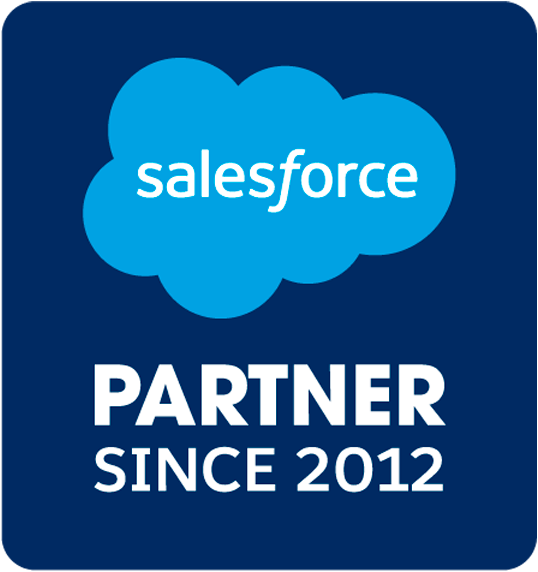Until you spend some time living in the world of Salesforce, it’s hard to comprehend the full scope of the company’s reach and the capabilities of their products. Yes, Salesforce is a CRM, but that’s like saying Apple makes computers. There’s a lot more to the story.
As consultants, we get a lot of questions from people who are only just beginning to wrap their minds around what Salesforce can do. People who don’t even know what they don’t know yet. They’re eager to learn, but the learning curve is steep.
If a lack of Salesforce knowledge has become a roadblock for you, we want to help. Below are some of the top questions we hear from teams considering Salesforce. We hope our answers will combat some confusion.
1. Is Salesforce just a sales tool?
Given its name, you might think so. However, Salesforce provides a full suite of platforms that have the power to run the entirety of your business — everything from marketing automation to customer support. These platforms are designed to work together, creating the potential for flawlessly executed business processes.
And if Salesforce can’t do it, well … that leads us to our next question.
2. Can Salesforce integrate with [insert application]?
Just as Salesforce products are designed to work well with each other, they’re also built to pair with third-party applications, including ERP systems, accounting tools and pretty much anything else.
Keep this in mind, though: Integrations range from simple and out of the box to complicated and custom. Depending on what you’re trying to do, you may need to bring in a skilled developer.
(Want to know more about Salesforce integrations? Save your seat at our upcoming 20-minute webinar.)
3. How much training would my team need to learn Salesforce?
Here the answer depends on the complexity of your implementation. For a simple boot-up project, an afternoon should be sufficient — just long enough to show your people how to click around, make a lead, convert a lead, etc.
For a larger or more complex implementation, however, you should plan on offering significantly more training. Different teams (sales, marketing, customer service) will need devoted sessions in order to master the specific ways they’ll be expected to use the new platform.
It’s not uncommon for a company to skimp on training hours in order to save money, but in our experience, this isn’t a great idea. The problems that arise from a poorly trained team are likely to cost you more in the long run.
{{cta('08493866-0a0d-44f0-8fff-708c09d499a2')}}
4. How long will it take to get Salesforce up and running?
Again, this will depend on complexity. A very simple build could take as little as two or three weeks. Transforming your entire business? That could take a year.
The average Salesforce implementation, however — one with a reasonable number of customizations — is more likely to last a couple of months.
5. Where should I even start?
The best way to begin the implementation process is to assess the state of your core business processes, either internally or with the help of a consulting firm. Some good questions to ask include:
- How does your business run, and how will a CRM help it function more efficiently?
- What are your current pain points?
- Specifically, what do you hope to get out of Salesforce?
Answering questions like these will help you understand your best implementation options, as you consider Salesforce.
6. How do I get my team to actually use Salesforce?
Salesforce adoption is one of the biggest challenges users face, and it’s an especially frustrating one. After putting so much time, money and energy into a Salesforce build, nobody wants to see their implementation fail due to a basic lack of use.
The most effective way to boost Salesforce adoption starts at the top. Leaders need to explain why the platform will be good for the company and how it will make the lives of its users easier. And they need to make it clear that not using Salesforce isn’t an option.
If your team knows how strongly you believe in Salesforce, they’ll be much less likely to keep hiding their data in spreadsheets.
7. Can I start small?
Some leaders are skeptical about implementing a suite of platforms all at once in order to completely overhaul their business — and rightly so. That’s a huge undertaking, even if it feels like the right move.
Thankfully, you don’t have to slay the dragon all at once. Instead, start with a basic setup of one of Salesforce’s core products. You’ll still be able to accomplish a great deal, but you won’t have to commit so many resources up front.
Down the line, when you’re ready to expand, you’ll be able to increase the capabilities of your platform with any necessary customizations and integrations.
8. Can I use Salesforce on my smartphone?
You can! The Salesforce mobile app allows you to do many of the same things as the web version. This is especially useful for salespeople on the road and service teams frequently out in the field.
9. How can Salesforce help me understand the health of my business?
A key goal of any successful Salesforce implementation is making sure your org is built to measure the things that matter most. You want to gather data that’s tied directly to your team’s metrics and KPIs so you can track their successes.
By keeping all this data stored in one system, you’ll be able to see a holistic picture of your business. Where is the company thriving, and where is it underperforming? Which teams are consistently reaching their goals? Custom dashboards make it easy to get answers.
Hopefully these answers will help to orient you, as you're considering Salesforce. If you’ve got other questions, let us know. Salesforce is our passion, and we love sharing what we know.



